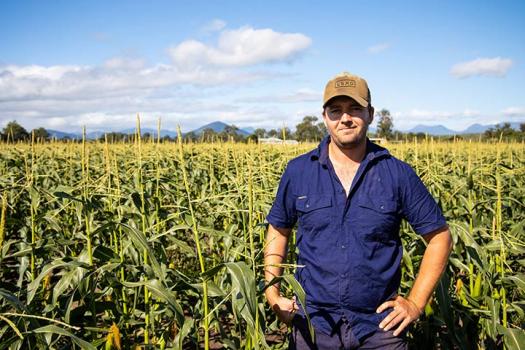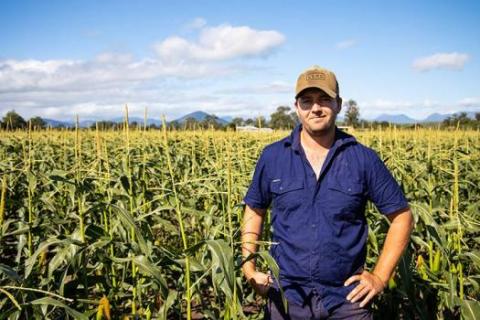The 27-year-old farms 190 acres of green beans, sweet corn, mung beans, barley and chickpeas at his Scenic Rim property using skills and lessons passed down through five generations on the land.
His father taught him the essentials when Scott was young, skills he has adapted and used through periods of rain, hail and shine.
Scott accessed a Sustainability Loan from QRIDA in 2018 to purchase his share of the family farm and make his own mark in the industry he grew up in.
“Farming is just what I always wanted to do, I never thought about doing anything else. I was on the tractor before and after school, it’s just the way it was,” Scott said.
“We started off with just the basic jobs, slashing and stuff like that, but I was probably into farming a lot more than other people my age. I was always asking Dad what I could do. He taught me a few things pretty early, I would always be on the tractor with Dad.”
Scott turned the predominantly lucerne farm into a grain and vegetable farm using a fresh approach and new technologies.
“We have been helping Dad make hay since we were kids but I get more satisfaction out of growing vegetable or a grain crop,” he said.
“I’m running it just by myself but Dad is still getting round every now and then. I think he would like me to have lucerne but when he was my age he was into the vegetables until the local vegetable packing facility shut down and caused him to look at other crop options. He went into lucerne so I’m starting off where he started.
“He’s happy doing what he’s been doing for the last 40 years but I want to try new things and push things forward. Every crop has to be better than the last and we are using a lot more technology than what we used to, looking at things like soil and tissue testing, trying to get it spot on.
“Back 20 years ago, no one was massively into that, they just planted it and hoped for the best.
“We are always learning and trying new things.”
Scott said his introduction to independent farming had been challenging, with relentless hail storms and drought.
A flood in April 2017 took half a year’s crop, in January 2018 a hail storm claimed half again and a few months later Scott said he lost everything in another hail storm.
“We’ve been in drought in between, it’s been tough,” he said.
“Since I have started we’ve had a bad run.
“After the last hail storm we thought, why are we even doing this, we worked so hard to get in front and in an hour it’s all gone. Once that happens three times in two years it’s a bit tough but we are back on track now.
“We have had good rain this year already, twice the rain we did last year.
“It helps but we know it can just stop at any stage and not rain for another four months, it has happened before. If we didn’t get what rain we did, it would be getting pretty hard and we’d have to scale back.”
Scott said he already knew to turn to QRIDA when he was ready to purchase the farm.
South East Regional Area Manager Brian Coe was able to meet Scott on-farm to help him through the application process and answer any questions.
“We had known about QRIDA for a few years and when I started looking into buying part of the farm, I rang the office and talked to Brian,” Scott said.
“It was all very easy. Brian came out to the farm and helped me with the paperwork, he helped me do everything so it was easy.”
He said his transition into owning a farm would have taken longer without access to QRIDA services.
“The interest rate was good, better than anywhere else. I like QRIDA supports people like me, young farmers coming through.
“I also like it’s flexible, so if we have a bad year there are options. QRIDA has been really good and very helpful, I have never had any troubles.
“It would have been a lot harder to get to where I am without the loan.
“It was good Brian was able to come out because if he didn’t, I might not have got through the application.”
He said he encouraged other aspiring primary producers to get in touch with QRIDA when they were ready to make the next move in their primary production enterprises.
“What I have learnt is when people talk about QRIDA loans, they talk about it being a lot of paperwork but it’s not that hard and it’s worth it,” he said.
“I’m glad I went with QRIDA.”
Sustainability Loans of up to $1,300,000 are available to assist in achieving a more productive and sustainable primary production enterprise.
Visit QRIDA Sustainability Loan to find out more.

